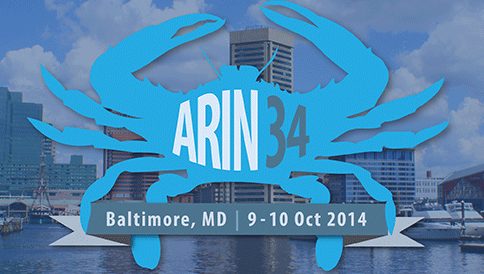 Next week is the ARIN meeting in Baltimore. There also will be a public policy consultation at Nanog 62 on Tuesday morning. Here is my look ahead at the some of the nine policies being discussed at the meetings. There is only one recommended draft that will be discussed, but lots of other draft policies are on the agenda and we will be looking for input on how to proceed.
Next week is the ARIN meeting in Baltimore. There also will be a public policy consultation at Nanog 62 on Tuesday morning. Here is my look ahead at the some of the nine policies being discussed at the meetings. There is only one recommended draft that will be discussed, but lots of other draft policies are on the agenda and we will be looking for input on how to proceed.
2014-9 Resolve RSA & 8.2 Transfer Conflict
Policy Summary: This recommended draft policy removes two words (“aggregate” and “reclaim”) from the mergers and acquisitions section of the transfer policy.
Discussion: The current registration services agreement, the contract that governs the relationship between ARIN and resource holders, has language which prevents ARIN from reclaiming address space when it is underutilized. However, the M&A transfer policy has language which prevents an organization from transferring their resource into their new name when they are underutilized. Because of this, we end up with orphaned records which don’t really match the new organization who is the new resource holder. Initially the draft policy had language in it which would have solved this problem, but this was removed because a number of critics of the policy believed that needs testing still should be performed and enforced for M&A transfers.
At this point, when IPv4 addresses are assets which can be transferred by sale to another organization, the limits in the M&A policy don’t make sense to me and only seem to create an environment where number resource records are not updated because current utilization rates may not be met across the new or combined organization. Still this seems like a symbolic change that people have supported and will probably achieve consensus at the meetings.
2014-14 Remove Needs Test on Small Transfers
2014-20 Slow Start Transfer & Simplified Needs
Both of these policies are suggesting changes in the transfer policies due to the imminent run-out of the IPv4 free pool and the changing requirements of the transfer market.
2014-14 Policy Summary: This draft policy removes needs testing from blocks which are smaller than /16 and permits an organization to have one needs-free transfer per year.
2014-20 Policy Summary: This draft is a complex change to both the current IPv4 policy and its related transfer elements. It seeks to significantly change how we look at the various aspects of obtaining addresses from ARIN or on the transfer market.
Discussion: I believe that changes are necessary for the transfer policy and the existing IPv4 policy as the free-pool is depleted. How we address these changes is critical to the success of ARIN and its mission, but also the success of the transition to IPv6. These two policies take different approaches toward the changes which are necessary after IPv4 depletion in the ARIN region. I suspect there will be a lot of discussion about these two policies and the need to update the existing policy set in a post IPv4 depletion world.
2014-16 Section 4.10 Austerity Policy Update
Policy Summary: This draft policy creates a new subsection of the policy manual to provide an austerity pool of IPv4 resources for organizations which do not currently have any resources directly from ARIN.
I drafted this policy after a number of discussions at the last ARIN meeting in Chicago where it was noted that the current IPv4 policy has limitations inherent in it for new entrants. This draft was modeled on the successful implementation of similar policies in the APNIC and RIPE regions.
Discussion: Most of the discussion about this draft has been about how to divide up the current /10 and the IANA reclaimed blocks between the existing transition technology pool and the new pool created by this policy. Hopefully, it will become clear during our discussions if the community supports creating an austerity pool and how they wish to divide up the currently reserved /10 and the IANA reclaimed blocks for new organizations which do not currently have address blocks from ARIN.
2014-17 Change utilization requirements
Policy Summary: This draft policy changes how IPv4 utilization is calculated to deal with limitations on subsequent allocation for some organizations.
Issues: The draft policy currently changes the utilization definition for all organizations. The side effect of this is that large organizations could obtain large new blocks just from the implementation of this policy. A few options to change the draft policy text are being discussed to deal with this issue.
Discussion: This policy fixes a known issue for smaller organizations which has occurred due to the smaller 3-month allocation model that is currently in use for subsequent allocations. While this policy lowers the utilization bar and has the perceived negative effect noted above for large organizations, this policy as written now could be beneficial for the transfer market as it would make it easier for organizations to meet the utilization requirements for future transfers.

 The
The